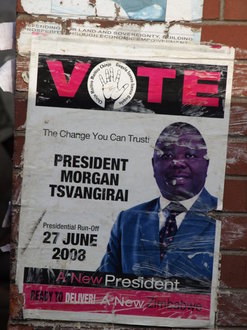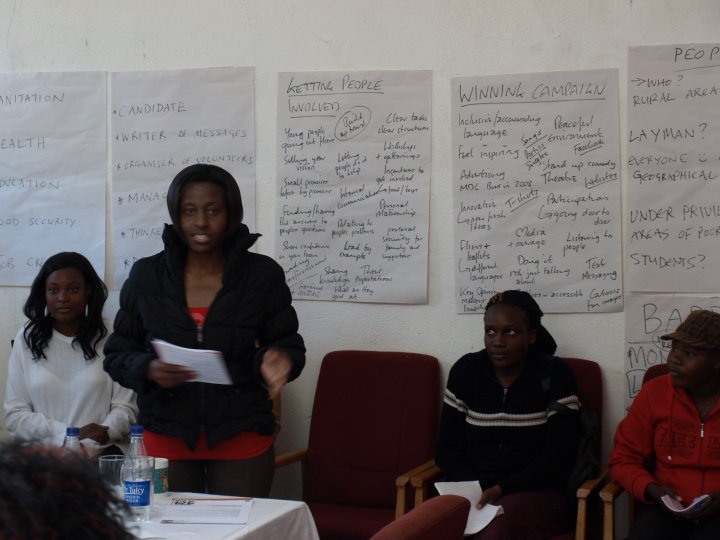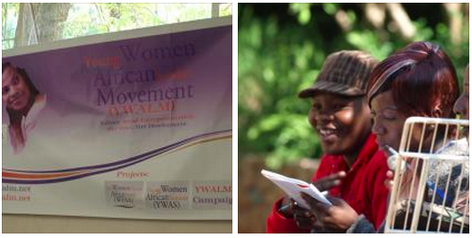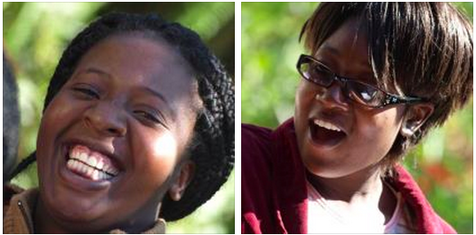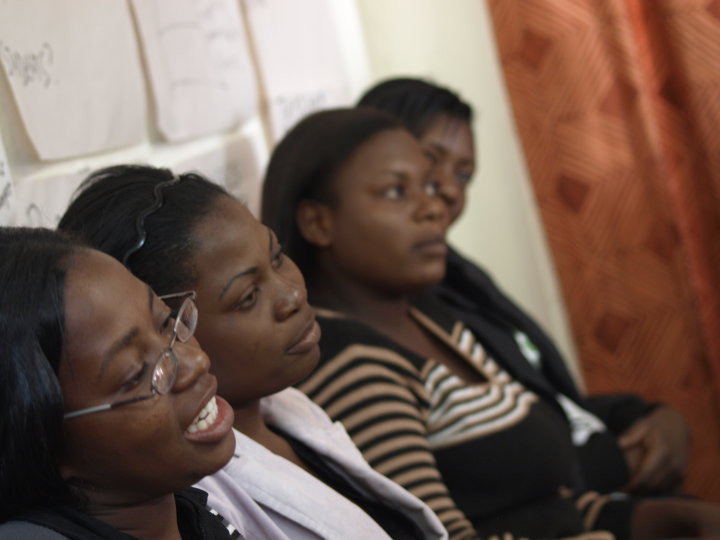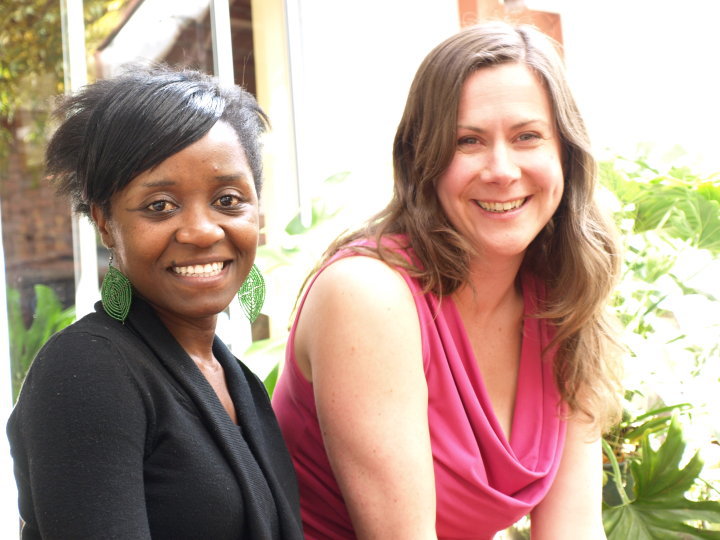
|
|
Reflections on women and politics in Zimbabwe*
"Above all, Campaigning should be enjoyable" says Ed Fordham, who fought a seat in the UK General Election - but lost out by a painful 841 votes to Labour's Glenda Jackson. This was the message we were giving to a group of young women gathered to form hopefully one of the most significant campaign groups in Zimbabwe in recent times. The women are resolved to support and train each other to successfully contest upcoming local and national elections. Some of them are independent, but may of them have already chosen their party rosettes. Our training last week was designed to encouarge, inspire and above all 'change the record' on Zimbabwean politics. Talking to Ed they could see how campaigning could be like - exhausting yes, but not the way it seems to work in this region of the world.
Zimbabwe never fails to confound expectations. Every visitor starts a comment more or less with 'I never thought it was going to be like this...' or some such variant. The issue is that although there are well known and very 'loud' issues coming out of Zimbabwe, especially during election time, the country itself, and its people, are peaceful, kind, warm, generous and above all positive about their future and their desire for political and civic progress.
Zimbabwe never fails to confound expectations. Every visitor starts a comment more or less with 'I never thought it was going to be like this...' or some such variant. The issue is that although there are well known and very 'loud' issues coming out of Zimbabwe, especially during election time, the country itself, and its people, are peaceful, kind, warm, generous and above all positive about their future and their desire for political and civic progress.
|
In June 2010 the British Council invited myself and Ed to Harare to do two things, first to present to the business and academic communities various talks on the general election and on effective communication. Secondly, to deliver a series of training workshops to young women interested in standing for election.
Even though this was my third trip I am still have much to learn about what is going to work with a Zimbabwean audience (which explains their wry smiles when I innocently used a photo of Tony Blair in one of my powerpoints - forgetting completely how much he is pilloried by the local Zim establishment). But despite these faux pas - their reception to us was always universally enthusiastic and informed. Their interest and knowledge of international and European politics seemed better than the average British audience. Despite everything, Zimbabweans still retain a reputation in Africa for having one of the most educated and developed nations. |
As a foreigner, the first surprising thing you realise when you get to Harare - is there is a substantial international and diplomatic presence in Zim, not least due to the cholera outbreak of some months ago. Indeed bilateral aid to the country is estimated last year at US $90 million. The British Council has had a long and impressive history working with civil society - the 'soft' end of British diplomatic activities. The Director there, Rajiv Bendre, (a veteran of Sierra Leone among other places) said his view was the British Council's job was to 'make friends and influence people for Britain'. So he has a tough job here for him at the moment - one of President Mugabe's recent pronouncements was the sooner the British remove themselves from Zimbabwe the better. Quite.
|
Notwithstanding this - what the British Council is doing is quite remarkable. Civil society - young women's movements, entruepreuners, business leaders, students and enlightened community leaders and councillors are all impatient to move on from what could be termed as 'post-independence strife'. The British Council is supporting these groups - enabling quiet conversations to take place, giving a nudge of support here, setting up an interesting connection there. They are of course politically 'neutral' (and I think with good reason) but they are also getting to know the political leaders of tomorrow. What is also clear is that the dividing lines between the political parties are not so simple as reports suggest.
|
There are, effectively, 4 political groupings operating in Zimbabwe. In addition to Zanu PF (Zimbabwean African National Union, Patriotic Front), Morgan Tsvangirai's party, the Movement for Democratic Change has now split into MDC-T and a new faction, MDC-M led by an academic, Arthur Mutambara. The latter is much smaller than the other two, but has the distinct quality of washing up most of the MDC's popularity in the southern area around Bulaweyo, where Zimbabwe's second largest tribe the Nbebele dominate. During the independence struggles the Nbebele, led by the legendary ZAPU party leader Joshua Nkomo, fought as a distinct army, separate from Mugabe and the ZANU leaders. The conflict in Matebeleland in the 1980s, shortly after Mugabe assumed power could only just politely be called a civil war. Many still feel, with at least 20,000 dead, it was more a form of ethnic cleansing of the Nbebele. In other words, the Nbebele are no friends of ZANU. What makes this tension even more interesting is an attempt to re-establish ZAPU, led by former ZANU PF minister and member Dumiso Dabengwa. Finally, as keen observers will remember, Robert Mugabe's own leadership faced a challenge a couple of years ago from Simba Makoni, the former, and much respected, ZANU finance minister. Makoni has formed his own political party (National Alliance for Democracy) with some interesting and senior support from the Zimbabwean establishment figures.
|
Our training was not to support one or other of these factions. We were there to support the vision of the young women themselves, to change the face of African politics by challenging two key assumptions behind 'big man' politics in the region; age and gender. Although there has been progress on the theory of greater participation of young people and women in politics, inequalities and institutional barriers are still very dominant. "In Zimbabwe, 'Women Can Do It' was run as a campaign to get women into public office in the 2008 elections" says Shingie Chimuriwo, from Norwegian's People Aid (NPA), the organisation helping to fund the workshop we facilitated, "from the assessment we realised that there was no deliberate effort to involve young women and this meant that they fell through the cracks".
|
The overwhelming headline from the 4 days spent with these young women - drawn from youth groups and women's organisations, was how impressive they were. Articulate, imaginative, brave (yes, brave), and determined. The group had been convened by young women activists Rutendo Mudzamiri and her colleagues Esther, Grace and Kudzai. While there, we met many women working in the field of women governance and civic engagement. It is clearly a thriving network of activism, campaigning and mutual support. The group have resolved to form a campaign that identifies and involves young (aged 20-30) women across Zimbabwe in every province. The overall objective of the campaign is to get a young women elected at a local or national level - and to support every young woman as far as possible in their similar endeavours. This sounds ambitious indeed, but the feeling was 'better to strive and fail, than to accept what they are currently getting from their respective political elites'.
|
They certainly are the daughters of their future. What came up was not bitterness or outrage over past grievances or the hugely dominant 'land' issue. Rather they talked about economic inequality for women, reproductive health, 'hot seating' where children school out in the open under the sun's glare and have to come to school at different times in a day to share scarce resources. They had detailed and stimulating debates about the merits of community health clinics, how to balance the bread and butter issues of shelter and food with the key topics of human rights and reform. In short, they were all aspiring politicians who could see the importance of the grassroots issues - and wanted to use their (many of them advanced) degrees for some form of good.
|
In the end we saw enthusiastic candidates - those who wanted roles in running a campaign, policy experts and obvious 'fixers' and 'doers'. And all of them were well below aged 30. From our perspective, we struggle in Britain to attract young dynamic women into politics - with notable exceptions which are few and far between. For once we actually share something political in common with Zimbabwe. So it was very exciting for me and Ed to look at a group of 30 or so women and see many future politicians among them. Suddenly we could see what a future Zimbabwe could be like, with them leading it.
|
The founder of the Young Women African Leaders Movement (YWALM), Rutendo Mudzamiri said "This is just the start of our journey - but we are resolved to ensure that with our perseverance we will succeed in getting more young women elected into our national and local chambers. What is important to us is we foster a non-partisan and mutually supportive network so we can celebrate together every achievement of each individual". In a region at the moment dominated by the feral machismo of the world cup (cricket was more often mentioned in our circles I have to admit) it was refreshing to see these young women standing up for themselves - and an inspiration to others around the globe. They deserve recognition and support. I hope they get it.
You can read the full report of the programme here. |
* This article is dedicated to Shingie Chimuriwo, who worked for Norwegian's People's Aid - a co-funder of this project. Shingie was a pioneer and advocate for political reform in Africa - and an inspiration to all women activists in Zimbabwe. Sadly, Shingie passed away in March 2011 after a dreadful car accident involving a drunk driver.
Many tributes have been published for Shingie which you can read here.
All photos courtesy of Ed Fordham
Many tributes have been published for Shingie which you can read here.
All photos courtesy of Ed Fordham
